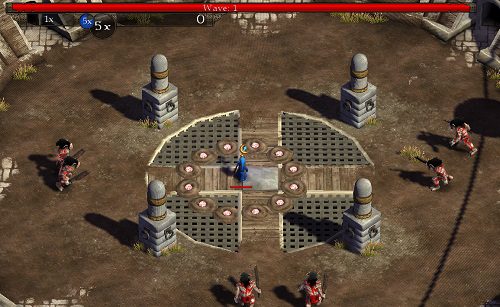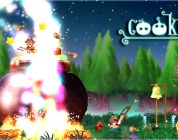This review comes to us from one of our readers, Steven Finch. Steven is a friend to two of our staff members, Kyle and Ben, so we’re pleased to feature his work on our site. If you’re interested in submitting an opinion piece or review for Marooners’ Rock, send us an email!
………….
Magicka: A Magickal Review
I originally picked this game up because of its budget price and brief recommendation from a friend. It was a fantastic buy.
The game begins with the narrator introducing the world of Midgard, a high fantasy realm with wizards, warriors, goblins, various other monsters, and people. Sometime in the past (recent or distant, it’s not very clear), Grimir, a wizard from the Order of Magick, began amassing knowledge of spells to “bring peace to the world.” However, the other wizards did not care for that idea and banished him to World’s End. Peace returned only briefly as Khan, the goblin king, united the goblin tribes and began assaulting villages and cities.
As you may have guessed, Magicka borrows heavily from Norse mythology. Since the game was developed by eight college students from Sweden, it makes sense. Aside from Norse mythology, there are dozens of game and pop culture references; from the obligatory 300 reference (you know the one) to an obscure King’s Quest moose reference.
But enough of literary elements of the game, how is the game play? Let me start by saying magic systems have always been a focal point for me when it comes to games and Magicka is all about its magick system.
Players have a magick queue that can hold five elements of varying amounts. The base elements of the game are Life, Arcane, Cold, Fire, Barrier, Earth, Lightning, and Water and there are two advanced elements Ice (water/cold combo) and Steam (water/fire combo) making a total of ten elements. Some elements can only be added once (barrier) and others cancel each other out, like life and arcane. Now, when you fill your magick queue, there is five ways of casting said magick; On self, on sword, frontal blast, all around blast, and as a Spell. For the first four methods of casting, the combinations of the elements determines the form of the cast. For example, combining fire and arcane as a frontal blast creates a fire/arcane beam but, if you add earth to the mix, it creates an exploding fire/arcane/earth ball and if you add barrier instead of earth it creates fire/arcane land mines and if you…
Right, I’ll stop. There are 4000+ combinations and I could go on for a while here.
Anyhow, the fifth way of casting magick is via spell. Spells add utility to the player and most of them are not needed, with the Revive spell being an exception and greatly needed during multi-player. In order to cast a spell you need to first learn the spell via spell book, then you have to add the proper elements to your queue in exact order given by the spell, and then press the action button to unleash the spell. Some spells, such as Revive and Haste, only need two to three elements making them easy to cast. However, spells like Thunder and Tornado use several basic and advanced elements making them actually cost six to seven elements. During the fast paced combat of Magicka, theses spells simply are too time consuming to be used in a regular fashion.
That covers the magick system, now for the actual game play.
My first suggestion is to use a controller to play this game, preferably an Xbox 360 controller as the game maps the buttons automatically. That aside, this game can be played solo, local multi-player or over the inter-webs multi-player.
Now I started playing this game solo. The game starts by literally dropping you into a tutorial level that explains the basics of magick. The next few levels are pretty easy enough with most of my early deaths resulting from drowning or killing myself via arcane/fire/lightning landmines. Then shortly after crashing the air ship, things started to get hard and I decided to change tactics by going local multi-player. For this endeavor, I enlisted the help my my younger brother EJ. Say hi to the folks EJ.
EJ says hi.
Like Streets of Rage or Battletoads, adding extra players is a game changer. This is where the two of us began to learn about beam spells which, apparently, have special rules. Now, if two beams are made of similar magick, such as arcane/cold, create an intensified beam when they cross but, if two beams of different magick, such as arcane/fire and arcane/cold, creates an huge explosion that kills everyone when crossed. Beams that bounce off of barriers reflect back onto themselves and create an explosion that kills the person casting the beam. And these rule apply to both player and enemy beams. So thanks to beams, player related deaths increase but progression also increases. That’s right, through coordination we progressed decently.
Now, there is a challenge mode within the game. Let me tell you, it’s a challenge. Gang rape is the easiest way to describe it.
On a side note, Magicka is a prime example of the robustness of the XNA framework. I gave out a girly giggle when I had to install the XNA 3.1 distributable when I first loaded the game. If you know not of the XNA, your fine, its a programming thing and I’ll leave it at that.
Magicka, it’s on Steam, go get it. Any Indie game that sells 200,000 copies in seventeen days cannot be bad.






